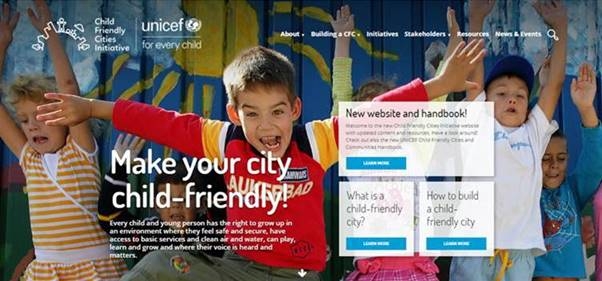With more than half of the world’s children living in cities, now more than ever is the time to call on local leaders and the stakeholders they work with to take action for children, especially the most vulnerable.
To this end, UNICEF’s Child Friendly Cities Initiative (CFCI) has developed two new products: the UNICEF Child Friendly Cities and Communities Handbook and new CFCI website. Building on over 20 years of the Child Friendly Cities experience, the new Handbook and website underline the importance of respecting and realizing children’s rights in the development of cities and communities.
The Handbook presents UNICEF’s vision for a child-friendly city and a framework to establish a Child Friendly Cities Initiative to help cities do better for children and reduce inequalities within their jurisdictions.
The new Child Friendly Cities Initiative website profiles UNICEF-supported Child Friendly Cities Initiatives around the world and provides resources and examples to help local governments as well as other stakeholders including civil society, the private sector, media, academia and children themselves build better cities and communities for children.
These resources are designed for:
- City leaders and municipal workers involved in building child-friendly cities and those interested in doing so
- Civil-society organizations that are involved protecting and promoting child rights and wellbeing
- Private sector partners and foundations interested in improving the lives of children in cities and communities
- Youth organizations within cities and communities

UNICEF’s vision for child-friendly cities
The vision for child-friendly cities, ‘Every child and young person enjoys their childhood and reaches their full potential through equal realization of their rights within their cities and communities’, is broken down into five goals that capture the rights enshrined in the Convention on the Rights of the Child:
- Every child and young person is valued, respected and treated fairly within their communities and by local authorities;
- Every child and young person has their voice, needs and priorities heard and taken into account in public laws, policies, budgets and decisions that affect them;
- Every child and young person has access to quality essential social services;
- Every child and young person lives in a safe, secure and clean environment;
- Every child and young person has opportunities to enjoy family life, play and leisure.
The Child Friendly Cities Initiative
The Child Friendly Cities Initiative (CFCI) is a global UNICEF-led initiative that supports municipalities in realizing the rights of children at the local level where they are most affected.
It is also a network that brings together government and other stakeholders such as civil society organizations, the private sector, academia, media and, importantly, children themselves who wish to make their cities and communities more child-friendly.
The Initiative was launched in 1996 by UNICEF and UN-Habitat to act on the resolution passed during the second United Nations Conference on Human Settlements (Habitat II) to make cities livable places for all. The UN Conference declared that the wellbeing of children is the ultimate indicator of a healthy habitat, a democratic society and of good governance. Today, the initiative is active in more than 3,000 cities and communities in 38 countries, reaching up to 30 million children.




